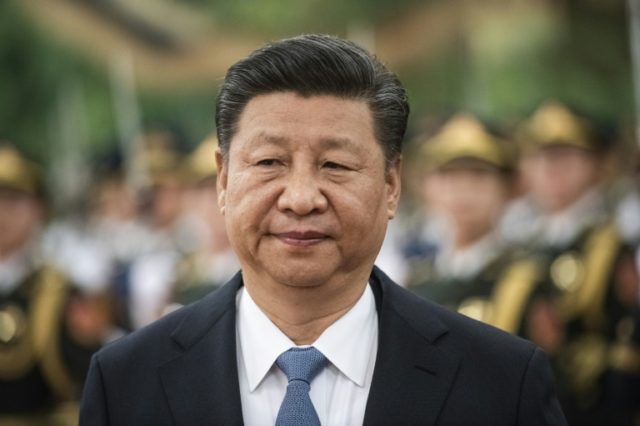Chinese police reportedly arrested a man for delivering a public speech in Chongqing demanding that Communist Party leader Xi Jinping resign, Radio Free Asia (RFA) confirmed on Monday.
The man, identified as Zhang Jilin, reportedly said in an audio tape RFA acquired that he was going to deliver his public speech because he believed that other Communist Party leaders were as disenchanted as he was with Xi and that “the authorities won’t do anything to us” for attacking Xi personally.
While Xi has faced the usual opposition from human rights advocates, religious leaders, and anti-communists, several scandals of a non-ideological nature such as the widespread administration of faulty vaccines to poor children and the silencing of radical Maoists have made him extremely unpopular with sectors of Chinese life that typically do not challenge the government.
Zhang, RFA notes, has a history of dissidence using his online alias “Yue Family Gun.”
“Overall, I think that the time has come to force Xi Jinping out of office,” Zhang says in the audio RFA reported it has received of his speech. “If you don’t believe me, just watch me give this speech all day in the square, as the crowds of people keep on gathering.”
“I dare to speak out,” he continued, referencing the location of his speech. “I think Guanyinqiao Square will be our bridgehead in the struggle for democracy and constitutional government.”
A dissident familiar with Zhang told the outlet that he believed Zhang had gotten the impression that complaints about Xi in public would not result in his imprisonment because the government had not censored similar remarks he made on social media.
The Communist Party typically experiences public resistance from human rights attorneys, which it routinely imprisons, and members of religions not directly under the control of the regime. Christians who choose to worship outside of the legal “patriotic” church, for example, typically face beatings, arrests, and the violent demolition of their churches. In Xinjiang, China’s westernmost region, the regime has devastated the majority-Muslim Uighur population by imprisoning any Muslims feared to be too loyal to Islam and not rigidly adhering to the sermons of government-sponsored imams. As many as two million Muslims are believed to be locked up in internment camps throughout Xinjiang, forced to learn communist propaganda songs and work in sweatshops for no pay.
Yet Xi has personally faced criticism from typically friendly sectors of the population, like the nation’s student Maoists. During summer 2018, workers at the Jasic Technology factory began demanding the right to unionize, attracting support from Communist Party members who believed their calls for labor rights fell well within their ideological framework. Online blogs and journals featuring local Marxist thought leaders began facing violent police raids for their support of the Jasic workers; several editors-in-chief “disappeared” into police custody following their complaints that the government was not sufficiently Marxist and supporting the corporate and bourgeois interests involved. The sites themselves no longer exist.
In universities, student leaders protesting Xi’s moves against the workers also faced police scrutiny. In December, on Mao Zedong’s birthday, Chinese police disappeared Qiu Zhanxuan, the president of the student Marxist Society at Peking University, while he was en route to an event commemorating the late communist leader, believed to be responsible for tens of millions of deaths. Qiu ultimately resurfaced and the government moved to replace him with student leadership more friendly to Xi’s government.
Qiu was not the only Marxist arrested. Several student leaders disappeared last month in a similar fashion, only to resurface in government-made hostage videos surfacing on Tuesday. Two student leaders who had publicly supported the Jasic workers appeared in a video Tuesday claiming that she had been brainwashed by “radical leftists” – apparently a bad thing in Xi’s communist government – and had reconsidered their behavior.
Xi also faces a growing scandal over his government’s ineptitude in providing parents with functional vaccines for their children. Last summer, parents of at least 500,000 children were notified that the vaccines used on their children were expired, meaning their children were functionally unvaccinated for diseases such as rabies, polio, and tetanus. They had trusted China’s second-largest vaccine manufacturer, Changsheng, to make the vaccines; the company lied about their expiration dates. The government explained that they had no way of knowing how long Changsheng had been administering expired vaccines, so much older children, and even some adults, may be unvaccinated without knowing it. Parents throughout the country, primarily in Beijing but in other major cities as well, surrounded government buildings in protest.
Chinese health officials insisted they would handle the problem swiftly. Yet last week, officials in Jiangsu were forced to admit that yet another group of at least 145 children received expired polio vaccines, triggering new protests.

COMMENTS
Please let us know if you're having issues with commenting.